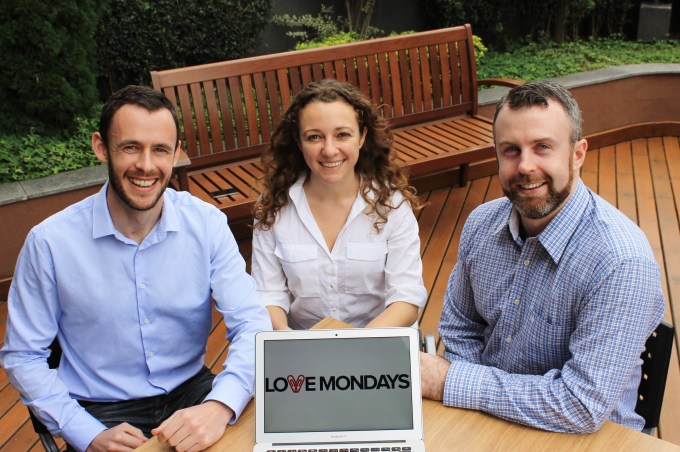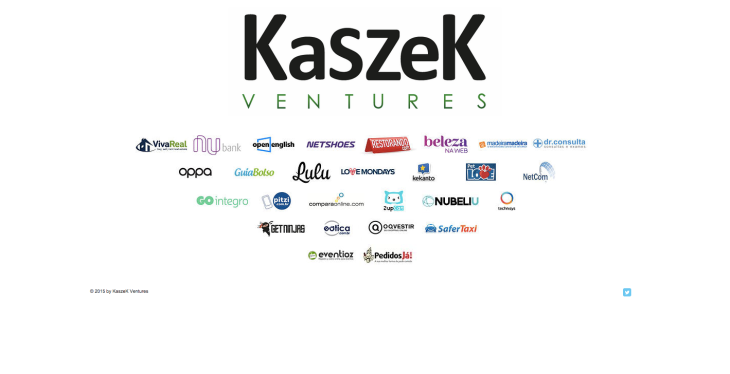Editor’s note: Julie Ruvolo is a freelance writer and editor of RedLightR.io and RioChromatic.com.
Latin American powerhouse investors Kaszek Ventures have kicked off 2015 with back-to-back investments in startups founded and run by Brazilian women — Dress & Go, a luxury apparel rental site, and Love Mondays, an employer review site.
Prior to these investments, Kaszek had only one female-founded company in their portfolio of 28 — OQVestir, a Brazilian luxury ecommerce site that closed a Series A in 2011.
There are no official stats on the proportion of male versus female entrepreneurs in Brazil, but everyone interviewed for this story agreed the gap is probably greater than in the US. And while female entrepreneurs in the US are benefiting from networks like Girls in Tech, #changetheratio and the Lean In phenomenon, it’s a culture that is only starting to take root in Brazil.
Add that to the relative dearth of venture capital available to Brazilian entrepreneurs, and the Kafkaesque tax bureaucracy that makes it particularly difficult to start a startup — and you can start to get a sense of what a big deal it is for Dress & Go and Love Mondays, both run by a Brazilian woman with a finance background, to secure their first institutional financing.
Each company bootstrapped its way to Kaszek, and both of the founders have unique take on the opportunities in the Brazilian market.
Dress & Go: A Brazilian Take On Rent The Runway
Dress & Go is a Rent-the-Runway style service that allows women anywhere in Brazil to rent clothes, primarily dresses, by top Brazilian and international brands. Barbara Diniz, 29, and Mariana Penazzo, 27, who met studying Economics at Insper in São Paulo, launched the business last year with their own capital after respective careers working in finance.
“The point was to do something that was online and interested us,” Penazzo told me on a Skype call from São Paulo with Diniz. Penazzo had left her job a year and a half earlier so she could tinker with new ideas, while Barbara was still doing equity research for an investment fund. “We always joke that I’m the poor one and Barbara is the rich one,” says Penazzo. “I had to go to a wedding and said, ‘Can I look at your dresses and borrow one?’” The next thought: Could they rent them?
Neither woman had heard of Rent the Runway, which by then had amassed over $80 million in venture capital, until they had lunch with Endeavor’s Institutional Relations Director, Fernanda Antunes. “She was like, ‘Calm down, do you want to open Rent the Runway in Brazil?’”
 The undisclosed Series A from Kaszek Ventures (Kaszek is reticent to share exact numbers) follows a seed investment of R$1 million [$320,000] in 2013 from Brazilian firm A5 Internet Investments. Kaszek’s Nicolas Berman will join the board along with Penazzo, Diniz and Paulo Humberg of A5, and Brazilian fashion heavyweight Marcella Kanner and former President of Louis Vuitton Brazil Carlos Ferreirinha are set to join the company as advisors.
The undisclosed Series A from Kaszek Ventures (Kaszek is reticent to share exact numbers) follows a seed investment of R$1 million [$320,000] in 2013 from Brazilian firm A5 Internet Investments. Kaszek’s Nicolas Berman will join the board along with Penazzo, Diniz and Paulo Humberg of A5, and Brazilian fashion heavyweight Marcella Kanner and former President of Louis Vuitton Brazil Carlos Ferreirinha are set to join the company as advisors.
The co-founders say the financing will primarily go towards growing the team and expanding the inventory, which currently sits at 2,500 pieces (Rent the Runway has over 65,000). “We talked to the Rent the Runway girls early on,” Diniz says. “They said the business is more capital intensive than people imagine, and it really is, because you are always buying new dresses. The business grows proportionate to the dresses.”
In addition to relying on a heavy investment in inventory, the rental model is a logistically demanding one, requiring partnerships for fulfillment, delivery and cleaning. “Logistics in Brazil surprised us, and not in a positive way,” says Penazzo. “We don’t have the same logistical capacity as the US, and had to organize ourselves around it in a lot of ways, including expanding the amount of time we allocate for the dress to arrive and come back. Logistics was our first big challenge.”
Dress & Go is currently over a thousand dresses per month, mostly by Brazilian designers, at a price point of R$150-R$800 [US$50-$260], and expects to close 2015 with sales in excess of $R8 million [US $2.55 million]. And while the price point may seem to peg Dress & Go as a service exclusively designed for Brazil’s elite, or “A” class, Diniz and Penazzo explain that renting is a more affordable option than purchasing for a socio-economic range of Brazilian women.
“The dry-cleaning fee alone is over R$100 [US$35] here,” explains Penazzo, “and we include that in the price of the rental, whether it’s a dress for R$200 [US$70] or R$5,000 [US$1,600].”
“In the US you have a lot of outlets and incredible sales,” Diniz adds. “You can get a great dress at a good price.” That doesn’t exist in Brazil, where foreign goods get hit with a hefty import fee that doubles the price on everything from Kind bars to imported cars.
Pair pent-up demand with what Diniz and Penazzo describe as “the best clients on the planet for renting brand dresses” to understand the implications of the Rent the Runway model in Brazil.
“Brazilian women are party girls. We’re vain, we lead the world with plastic surgery, we love to look good and make ourselves up, and rare are the women who will leave their house without putting at least some blush on,” Diniz generalizes. “Another point – Brazilians love brands. We love buying fake Louis Vuitton, fake Chanel, because we love to show we have the brand. On the other hand, the majority of Brazilians don’t have the acquisitive power to buy them, so renting is a way for them to be wearing the latest fashions at an accessible price. We are even shipping dresses to favelas.”
Diniz and Penazzo say there are over one million weddings per year in Brazil. According to research they conducted for their business plan, the number of women who can pay R$350 [US$110] or more to purchase a dress in Brazil represents a market opportunity of over R$3 billion [$960 million] per year.
We are even shipping dresses to favelas. Barbara Diniz
“There’s weddings in the rest of the world, and there’s weddings in Brazil,” explains Penazzo. “Brazilians invest surreal amounts of money in their weddings. So we have a lot of events for women from the A and B, even C [working middle] classes, where instead of going to have a dress made, they can rent a super-stylish one for the same amount. We don’t have the pretense to segment social clients. The big brands are the big point, but you can find more economic dresses by the same brands. Our dream is to not worry about social class.”
Love Mondays: Love Your Job
If Dress & Go is improving access to fashion beyond one’s purchasing power, Love Mondays, an employer review site dedicated to helping Brazilians forge their career paths, also has accessibility as a core value.
With anonymous employee reviews and salary disclosures of over 20,000 Brazilian companies, the company is announcing an undisclosed seed round with Kaszek Ventures.
“Our mission is to help professionals like you make good career decisions,” says the Love Mondays, which receives over 650,000 visitors per month from Brazilians considering a jump or seeing how they stack up against their peers. “Feel free to share what you like or don’t like about the company you work for, share your salary, and help other professionals negotiate fair remuneration.”

While employer review sites are well-trodden for the TechCrunch audience, from TheFunded and Glassdoor to new players like Memo, Love Mondays co-founder and CEO Luciana Caletti says it’s a radical concept in Brazil.
“Most people outside of Brazil don’t realize that Brazil has a very hierarchical work culture,” she tells me on a Skype call from São Paulo, referencing the Hofstede Power Index ranking Brazil above Japan in its belief that hierarchy should be respected and inequalities amongst people are acceptable.
“It’s surprising for someone who looks at Brazilian culture from the outside and sees that it’s very informal and relaxed, in terms of leisure time. But in corporate culture, people are much more careful with what they say and what they do in front of their workmates and bosses,” Caletti says. “I get calls from HR directors who tell me they aren’t getting real feedback from their internal surveys and ask how we can get them to post to Love Mondays.”
Caletti started Love Mondays in 2013 with co-founders David Curran and Shane O’Grady after a non-linear career trajectory that is atypical for Brazilians, but not uncommon for tech entrepreneurs.
A week after completing law school in Brazil, Caletti decided not to become a lawyer and moved to London. “I’ve wanted to live abroad since I was fourteen,” she explains in impeccable English, “and worked as an English teacher on the side through school so I could travel abroad.”
After odd jobs as a waitress, call center attendant, and sandwich vendor, she got a job with the Brazilian Consulate, helping Brazilian citizens who were in trouble in the UK. Then she moved into management consulting and traveled globally for four years before getting an MBA at Oxford and joining Johnson & Johnson to lead new consumer product launches and slowly work her way out of grad school debt.
In corporate culture, people are much more careful with what they say and what they do in front of their workmates and bosses. Luciana Caletti
“I was getting to a point of my career where I’d have to give up too much,” Caletti recalls, “So I thought, either now or I won’t do it later.” She jumped to a “kind of investment fund” in Dubai to run “a kind of advertising startup”, where she shot the first TV commercial in post-war Iraq. Then she was ready to move back to Brazil with Dave Curran, her fiance who she met at Oxford, and Shane O’Grady, a longtime friend of Curran’s and the company’s CTO.
“I noticed a huge difference from the Brazil I’d left almost ten years ago,” Caletti says. “People were looking for a job that made them happy. In early 2004, unemployment was high, around 12%, and people who had a job that paid the bills at the end of the month considered themselves very lucky. Over the last ten years, the unemployment rate has fallen steadily, and with lower unemployment comes the choice of where to work. That’s a huge shift.”
The observation is not just anecdotal. Caletti cites a recent study by Robert Half International indicating Brazil had the highest turnover rate in the world in 2013, for all kinds of jobs from factory floors to corporate suites.
The trend has slowed in recent months with Brazil’s economy on the brink of disaster, thanks to a corruption scandalof surreal proportions with federally owned oil giant Petrobras. The turnover is shifting from employees hopping to bigger offers, to employers replacing poor performers, but that may be a momentary blip on the radar. A 2014 report by the Boston Consulting Group says Brazil’s talent gap is only growing, and will reach over 40 million people by 2030 — prime conditions to support a cultural shift towards an employee’s market. And LinkedIn has already taken root in Brazil, with over 20 million members. “That’s great for us,” Caletti says.
“That’s where we saw the opportunity,” Caletti explains. “If there’s that demand for qualified professionals, who now have a choice of where to work, how do they make that choice?”
After initial funding from the three co-founders, R$200,000 [US$64,000] from Startup Brasil, a R$45 million [US$15 million] federal program to foment startup culture, and entry into the Aceleratech accelerator in São Paulo, the co-founders struck out for seed capital. While they spoke with Brazilian investors, they went the direction most Brazilian entrepreneurs we’ve covered in TechCrunch have gone and took on foreign capital, closing an undisclosed seed round with Kaszek in Buenos Aires. Kaszek’s Nicolas Berman will join Caletti and Curran on the board.
If there’s that demand for qualified professionals, who now have a choice of where to work, how do they make that choice? Luciana Caletti
The seed capital will be spent towards growing the team and community, and then to explore monetization. A mobile launch in January doubled the site’s traffic to 650,000 visitors per month.
The site closed out March with 160,000 reviews and salaries for over 20,000 companies in Brazil, with IT professionals leading the content seeding. Most of the growth is coming through social media or news stories citing data Love Mondays is aggregating on items like the biggest drivers for employee satisfaction (a good work environment) and dissatisfaction (a weak boss).
“We released a Happiest States report, which shows Brazil’s southern states are happiest,” Caletti explains. “That was inspired by Lulu, the app where women rate their dates. They did a map of the most popular man in each state.” (Lulu was taken down voluntarily in Brazil and expects to be back online soon.) Caletti also cites Glassdoor and TheMuse as inspirations.
As to the finer process of cultivating good community and honest content, Caletti tacks off some of the basics, like requiring users to register before they post, reviewing content before it goes live, and snooping around LinkedIn to check questionable posts to verify the poster’s career history. To encourage people to post content as well as consume it, Love Mondays requires visitors to register and post their own review to access past the first page of content.
Plans to monetize are not far off. Caletti says they want to allow companies to attract talent through Love Mondays. “Posting jobs, but more than that,” she explains. “We want to get employees to tell the story of the company and build the brand, and enable companies to attract talent that way.” As for the now-maligned Petrobras, 88% of its 345 anonymous Love Mondays reviewers would recommend the company to a friend.
